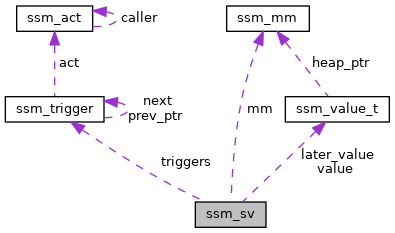ssm_sv Struct Reference
A scheduled variable that supports scheduled updates with triggers. More...
#include <ssm.h>
 Collaboration diagram for ssm_sv:
Collaboration diagram for ssm_sv:Data Fields | |
| struct ssm_mm | mm |
| ssm_time_t | later_time |
| When the variable should be next updated. More... | |
| ssm_time_t | last_updated |
| When the variable was last updated. More... | |
| ssm_trigger_t * | triggers |
| List of sensitive continuations. More... | |
| ssm_value_t | value |
| Current value. More... | |
| ssm_value_t | later_value |
| Buffered value for delayed assignment. More... | |
Detailed Description
A scheduled variable that supports scheduled updates with triggers.
Scheduled variables are heap-allocated built-in types that represent variables with reference-like semantics in SSM. These should be always allocated on the heap using ssm_new_sv().
Routines may directly assign to them in the current instant (ssm_assign()), or schedule a delayed assignment to them (ssm_later()). The last_updated time is recorded in each case, sensitive routines, i.e., triggers, are woken up.
At most one delayed assignment may be scheduled at a time, but a single update may wake any number of sensitive routines.
- Invariant
- later_time != SSM_NEVER iff this variable in the event queue.
-
for all
ssm_sv_t v,v.mm.kind == SSM_SV_K.
Field Documentation
◆ mm
◆ later_time
| ssm_time_t later_time |
◆ last_updated
| ssm_time_t last_updated |
◆ triggers
| ssm_trigger_t* triggers |
◆ value
| ssm_value_t value |
◆ later_value
| ssm_value_t later_value |
The documentation for this struct was generated from the following file:
